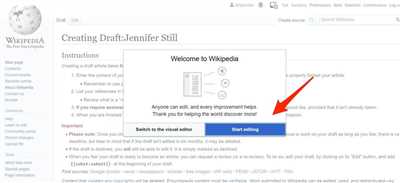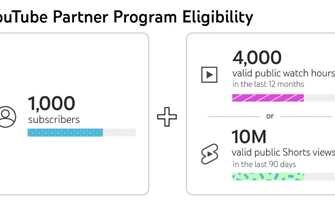
Are you someone who needs to edit or add information to a Wikipedia page? If so, there are certain steps you must follow in order to ensure that your edits and additions are accepted. Wikipedia is a popular online encyclopedia that allows independent editors to contribute and share knowledge on a wide range of topics. However, the site is also known for its strict guidelines and requirements, so it’s important to familiarize yourself with these before making any edits.
The first thing you need to do is create an account on Wikipedia. This is a simple process that requires you to provide some basic information about yourself. Once you have an account, you can start editing pages, but there are some limitations. For example, if you’re a new user, you may not be able to edit certain pages that are deemed “protected”.
Before you make any edits or additions, it’s crucial to do some research and gather reliable sources to support your changes. Wikipedia values verifiability and relies on independent, reputable sources to ensure the accuracy and reliability of its content. Without reliable sources, your edits may be removed or flagged as questionable.
When making your edits, it’s important to follow Wikipedia’s guidelines and rules. Use clear, concise language and try to avoid any conflict of interest. If you have a personal connection to the topic, it’s best to disclose this on the article’s talk page. Additionally, make sure your edits are written from a neutral point of view and are not promotional or biased in any way.
If you’re unsure about whether your edits comply with Wikipedia’s guidelines, you can ask for help from the community. Wikipedia has a vast network of editors who can provide guidance and feedback. You can reach out to them through the “talk” pages or post a request for assistance on relevant noticeboards. Remember to be patient and respectful when interacting with other editors.
Once you’ve made your edits, it’s important to regularly check the page for any responses or challenges to your changes. Other editors may revert or modify your edits if they believe there is a problem. If this happens, you can engage in a constructive discussion with them to resolve any conflicts and reach a consensus. Remember to cite reliable sources to support your arguments and be open to considering opposing viewpoints.
In some cases, your edits or additions may be deleted or the entire page may be flagged for deletion. This can happen if the content is deemed non-notable or violates Wikipedia’s policies. However, you have the opportunity to recover deleted content or contest the deletion by following the appropriate procedures outlined by Wikipedia.
In conclusion, posting to Wikipedia can be a rewarding experience if done correctly. By following the guidelines, providing reliable sources, and engaging with other editors, you can make valuable contributions to the site and help ensure the accuracy and integrity of its content.
- Announcing Wikipedia’s most popular articles of 2023
- You don’t need to pay for a Wikipedia article
- Who is Wiki-able
- 1 There needs to be ‘significant’ coverage
- 2 Coverage must come from reliable sources
- 3 Sources must be independent
- Wikipedia company pages FAQs
- How do I recover deleted Wikipedia pages
- Who deleted my page
- Can you remove yourself from Wikipedia
- About the author
- Sources
Announcing Wikipedia’s most popular articles of 2023
As we enter the year 2023, it is time to reflect on the incredible and diverse content that Wikipedia has to offer. From information about historical figures to detailed descriptions of obscure places, there is something for everyone on the world’s largest online encyclopedia.
But have you ever wondered what the most popular articles on Wikipedia are? Well, someone decided to find out!
In a recent study, people from all over the world were asked to list their favorite Wikipedia articles. The response was overwhelming, with thousands of suggestions pouring in. After carefully reviewing each request, the top 100 most requested articles were compiled and analyzed.
The articles cover a wide range of topics, from historical events and famous people to places of interest and scientific discoveries. Some of the most popular articles include “The History of Ancient Egypt,” “The Life of Albert Einstein,” “The Beautiful Beaches of Bali,” and “The Cure for Cancer: A Breakthrough in Medical Science.”
Contributing to this list is a major accomplishment for Wikipedia editors, who work tirelessly to ensure the accuracy and reliability of the information on the site. It is a testament to their hard work and dedication that the most popular articles on Wikipedia are trusted sources of information for people all around the world.
In order to be considered for the list, articles had to meet a set of strict guidelines. They had to be well-written, thoroughly researched, and properly sourced. Additionally, they had to have a significant number of edits from multiple editors and must have been covered by reliable media sources.
One of the main criteria for inclusion on the list was the article’s popularity. In order to gauge popularity, Wikipedia looked at the number of page views each article received over the course of the year. This data was then analyzed and the top 100 articles were determined.
So, if you’re curious about the most popular articles on Wikipedia, be sure to check out the list for yourself. From ancient history to modern science, there is something for everyone to enjoy and learn from.
And remember, Wikipedia is an open platform that relies on the contributions of volunteers, so if you have something to add or edit to these popular articles, you’re more than welcome to do so. Together, let’s continue to keep Wikipedia the go-to source for reliable and comprehensive information.
You don’t need to pay for a Wikipedia article

If you’re wondering how to post an article on Wikipedia without having to pay a fee, you’re in luck! Contrary to popular belief, you don’t have to shell out any money to create or edit a Wikipedia page. Wikipedia is an open and independent platform where anyone can contribute valuable information.
When it comes to creating a Wikipedia article, there are a few guidelines you need to follow in order to meet the site’s requirements. First and foremost, the information you provide must be reliable and verifiable. This means that your sources should be reputable and well-known, such as books, journals, or reputable websites. Wikipedia editors are very particular about checking the references, so make sure you provide accurate and trustworthy sources.
Another important point to keep in mind is that your topic must be worthy of an encyclopedia article. Wikipedia aims to provide information about significant subjects that are notable and have received substantial coverage in reliable sources. If your article is about a company or an author, for example, it must have enough coverage in independent sources to be considered suitable for Wikipedia.
One of the most common misconceptions is that you need to hire a specialist or a company to create a Wikipedia page for you. While some companies do offer their services to assist with Wikipedia editing, it is not necessary to rely on them. Wikipedia is designed to be a collaborative platform, and as long as you follow the guidelines, you can create and edit pages yourself.
If your article is deleted or faces conflict due to the content, you can always request a review or edit the article accordingly. Wikipedia has a comprehensive system in place to address conflicts and help recover deleted articles. They also have FAQs and resources available for guidance.
So, if you’re looking to contribute to the world’s most popular encyclopedia, don’t be deterred by the misconception that you have to pay. With a good understanding of the guidelines and a commitment to providing accurate and reliable information, you can make valuable contributions to the vast world of knowledge that is Wikipedia.
Who is Wiki-able
To post an article on Wikipedia, you need to meet certain criteria. Not everyone can just publish anything on this popular online encyclopedia. So, who is “wiki-able”? Let’s find out.
First and foremost, the article you want to post must have reliable sources. Wikipedia’s guidelines require that the information provided in the article comes from independent, authoritative sources. These sources should be reputable and well-regarded in their respective fields.
Secondly, the article must be about something or someone that is “significant” and has received sufficient coverage in these reliable sources. This means that a company or individual must have a certain level of prominence and notability to be considered for a Wikipedia article.
Thirdly, it’s important to note that Wikipedia is not a place for self-promotion or advertising. If you’re a company or an individual trying to write an article solely to promote yourself or your business, it’s unlikely to be accepted unless you have significant coverage in independent, reliable sources.
When posting an article on Wikipedia, you have to be careful not to create any conflicts of interest. This means you should not edit your own page or the pages of your company or organization. Wikipedia values neutrality and objectivity, so edits must come from open and independent authors or editors.
Before submitting an article to Wikipedia, it’s always best to do some checking. Make sure the article meets the formatting and content guidelines of Wikipedia, and avoid reproducing content that has already been deleted. If your article has been deleted once before, there may be a need for improvement or significant changes to recover it.
If you come across a page that you believe should be deleted, you can request it through the deletion process. However, it’s essential to follow the guidelines and provide valid reasons for the removal. Don’t remove content from a page yourself without a justifiable cause, as this could lead to conflicts or even the deletion of your own contributions.
Lastly, it’s worth noting that Wikipedia is constantly evolving and improving. Its policies and guidelines may change over time, so it’s essential to stay updated on the latest information. If you’re unsure about anything regarding posting to Wikipedia, it’s always a good idea to refer to their FAQs or reach out to the Wikimedia community for assistance.
In conclusion, not everyone is “wiki-able.” To have an article posted on Wikipedia, you need to meet the guidelines set by the community. It requires reliable sources, significant coverage, and adherence to Wikipedia’s policies and guidelines. So, if you want to make your mark on the world’s largest online encyclopedia, do your research, write a well-sourced article, and respect the community-driven nature of Wikipedia.
1 There needs to be ‘significant’ coverage
When attempting to post an article on Wikipedia, it is important to understand that there needs to be ‘significant’ coverage of the topic according to Wikipedia’s guidelines. This means that the subject of the article must have been covered in depth by reliable sources, such as independent media outlets or specialist publications.
If you’re not sure if the topic you want to write about meets this requirement, it’s best to do some research to see if there has been enough coverage. You can start by checking if there are existing articles or pages on Wikipedia about the topic. If there are, it’s a good indication that there is enough coverage.
However, if there are no existing articles or pages, it doesn’t necessarily mean that the topic is not eligible for inclusion on Wikipedia. It may just mean that someone hasn’t created a page about it yet. In this case, you can still proceed with writing the article, but you need to make sure that you cite reliable sources to support the information you include.
It’s important to note that not all sources are considered reliable by Wikipedia’s standards. Sources like personal blogs or self-published works are generally not considered reliable enough. The best sources are those from reputable publishers or organizations with a good reputation for factual reporting.
When announcing something new or a recent event, it’s crucial to have reliable sources that have covered the topic. For example, if you’re writing about a company, you may need to include news articles or press releases from reputable news outlets.
If your article does not meet the standard of ‘significant’ coverage, it may be flagged by other Wikipedia editors for deletion. This could happen if the editors believe that the topic is not notable enough to have its own page on Wikipedia. If this happens, don’t be discouraged. You can always go through the deletion process to contest the decision or work on expanding and improving the coverage of the topic to meet the guidelines.
It’s worth noting that Wikipedia’s guidelines do not allow you to create a page about yourself, your company, or something you’re directly involved in. Wikipedia aims to maintain a neutral point of view and avoid conflicts of interest, so it’s best to leave it to someone else to write about you or your company.
Overall, the key to getting an article posted on Wikipedia is to ensure that the topic has been covered in depth by reliable sources. By following the guidelines and providing the necessary coverage, you increase the chances of your article being accepted and staying on Wikipedia for others to read.
2 Coverage must come from reliable sources
When posting to Wikipedia, it is essential that your content is supported by reliable sources. These sources should meet certain criteria to ensure their credibility and reputation. Here are some guidelines to follow:
- Make sure the sources you use are independent and not affiliated with the subject you are writing about.
- Look for sources that have a good reputation, such as renowned news outlets or academic journals.
- Check if the sources have a track record of accuracy and fact-checking.
- Be cautious of using sources that have a bias or conflict of interest.
Wikipedia editors are vigilant about checking the reliability of sources, so it’s best to provide the most credible ones possible. If your article lacks reliable sources, there is a high chance it will be flagged for deletion.
It’s important to note that Wikipedia’s guidelines state that not all sources are equal. They require “significant” coverage from reliable sources. This means that merely mentioning a company or an individual in passing is not sufficient. The coverage must be substantial and meaningful.
If you’re having trouble finding reliable sources, consider reaching out to experts or specialists in the field. They can offer insights and point you towards reputable sources.
When citing sources, include the author, publication date, and title of the article. You can also add a brief summary or excerpt from the source to support your content.
Remember, the goal of Wikipedia is to provide accurate and reliable information. By ensuring your coverage comes from reliable sources, you contribute to the overall quality and reputation of the site.
3 Sources must be independent
In order to post an article on Wikipedia, it is important that the sources you use are independent and reliable. Wikipedia follows strict guidelines when it comes to sourcing information, and having independent sources is a key requirement.
When we say “independent,” we mean that the sources should not have a conflict of interest or be affiliated with the subject of the article in any way. This ensures that the information provided is unbiased and objective. Independent sources can include news articles, books, academic papers, and reputable websites.
To meet Wikipedia’s guidelines, the sources must also meet certain criteria. They need to be reliable, meaning that they should come from reputable and trusted sources. They should also be verifiable, meaning that readers should be able to check the sources themselves and confirm the information provided. If the sources are not reliable or verifiable, they may be deleted by other editors.
If you’re unsure about the reliability of a source, you can do some research to see if the author is a specialist in the field or if the source has a good reputation. You can also check if the source has been cited by other reliable sources, as this can add credibility to the information.
It’s important to note that Wikipedia is not a place for self-promotion or advertising. Pages that are created solely to promote a company or an individual may be deleted or marked for deletion. Wikipedia’s goal is to provide neutral and unbiased information, so articles must be written from an objective point of view.
When adding sources to your article, make sure to cite them properly according to Wikipedia’s guidelines. This includes providing information about the author, the title of the source, the publication date, and any other relevant details. Failure to cite sources correctly can lead to the removal of the information.
In summary, when posting to Wikipedia, it is crucial to use independent sources that meet the guidelines of reliability and verifiability. By following these guidelines, you can contribute to the accuracy and credibility of the information on Wikipedia.
Wikipedia company pages FAQs

Q: What is Wikipedia?
A: Wikipedia is a free online encyclopedia that anyone can edit. It is one of the most popular and widely used sources of information on the internet.
Q: Can I post an article about my company on Wikipedia?
A: Yes, you can create a Wikipedia page for your company, but there are certain guidelines and requirements that need to be followed. It is important to ensure that the information you add is accurate, neutral, and supported by reliable sources.
Q: How do I create a Wikipedia page for my company?
A: To create a Wikipedia page for your company, you need to first create an account on Wikipedia. Then, you can start editing and adding content to your company’s page. However, it is recommended to familiarize yourself with Wikipedia’s guidelines and policies before making any edits.
Q: What if my company’s page is deleted?
A: If your company’s page is deleted, you can try to recover it by addressing the reasons for deletion and making necessary improvements. It is best to discuss the deletion with the Wikipedia editors and follow their instructions to ensure a successful recovery.
Q: Can I pay someone to edit my company’s Wikipedia page?
A: No, you should not pay someone to edit your company’s Wikipedia page. Wikipedia has strict guidelines against paid editing and conflicts of interest. All edits should be made by yourself or other independent editors who have a neutral point of view.
Q: How do I ensure that my company’s page has reliable sources?
A: It is important to have reliable sources to support the information added to your company’s page. These sources can include independent media coverage, announcements from the company, or any other reputable sources. When in doubt, it is best to consult with experienced Wikipedia editors.
Q: What should I do if someone edits my company’s page with inaccurate information?
A: If you notice inaccurate information on your company’s Wikipedia page, you can edit the page yourself to correct the information. You can also bring it to the attention of the Wikipedia community by discussing the issue on the article’s talk page.
Q: Are there any restrictions on what I can write about my company on Wikipedia?
A: Yes, there are certain restrictions when writing about your company on Wikipedia. The content should adhere to Wikipedia’s policies and guidelines, and avoid promotional language or any form of advertising. The information should be presented in an unbiased and neutral manner.
How do I recover deleted Wikipedia pages
If you find that a Wikipedia page you created or edited has been deleted, there are steps you can take to potentially recover it. Here’s what you can do:
- Check the deletion log: The first thing you should do is check the deletion log for your article. This log will provide information on why the page was deleted and who requested the deletion.
- Contact Wikipedia editors: Reach out to the Wikipedia editors who worked on the deletion or removal of your page. They may have valuable insights and can provide guidance on how you can recover your content.
- Find reliable sources: To ensure your page meets Wikipedia’s guidelines, gather reliable sources that can support the content you want to include in your article. Independent sources and reputable publications are particularly important.
- Make your case: Compose a well-reasoned argument explaining why your page should be restored. Highlight the significance of the subject matter, the reliability of your sources, and any other relevant information that can reinforce your request.
- Submit a deletion review: If your page was deleted due to a deletion request, you can appeal the decision by submitting a deletion review. Follow the guidelines provided on Wikipedia to navigate through the process and present your case effectively.
- Consider getting professional help: If you’re having trouble navigating the deletion recovery process or you need expert assistance, you may consider hiring a specialist or a company that offers Wikipedia editing services. They can guide you through the intricate details and increase your chances of successful recovery.
Remember that according to Wikipedia’s policies, paid editors must disclose their affiliation and avoid conflicts of interest. When publishing content on Wikipedia, it’s crucial to ensure that the information provided is accurate, neutral, and properly sourced.
If you find yourself in a situation where your Wikipedia page has been deleted, don’t panic. By following these steps, adhering to Wikipedia’s guidelines, and working with the community, you may be able to recover your deleted content and contribute to the knowledge base of Wikipedia once again!
Who deleted my page
When you create an article on Wikipedia, it is important to understand that it can be subject to deletion if it doesn’t meet certain criteria. Deletion is done by volunteer editors who follow Wikipedia’s guidelines to ensure the content on the site is reliable and meets the needs of its users.
If your page has been deleted, it’s important not to panic. Instead, open the deletion log and the page history to see if an explanation for the deletion is provided. The log will show who deleted the page and the reason given for the deletion. In some cases, the deletion may be due to a lack of reliable sources, not meeting the notability guidelines, or not being written in an encyclopedic tone.
Before jumping to conclusions and assuming someone at Wikipedia is out to get you, it’s best to come to terms with the fact that there are certain requirements that need to be met in order to maintain the quality of articles on the site. If you believe your article was deleted in error, you can make a request to have it reviewed by opening a deletion review discussion.
When making your case for the recovery of your article, it is important to provide reliable sources that show coverage and notability of the subject. These sources could include independent news articles, books, or reliable websites. If you paid someone to write the article, be aware that this does not guarantee its inclusion on Wikipedia. Wikipedia’s reputation is built on its volunteer editors ensuring that articles are not advertising or biased.
Remember that Wikipedia is not a place for promotion or advertising, but rather a platform for sharing knowledge. If your article does not have enough reliable sources or lacks the necessary coverage and notability, it may be necessary to accept its deletion. Instead, consider contributing to existing articles or creating content on subjects that meet Wikipedia’s guidelines.
In conclusion, if your article has been deleted, don’t assume it was a personal attack or conspiracy against you. Instead, take the time to understand the guidelines and requirements set by Wikipedia. If your article does not meet these criteria, it may be best to move on and focus your efforts elsewhere.
Can you remove yourself from Wikipedia
According to Wikipedia’s guidelines, it is possible to have articles about individuals and companies deleted from the site. If you want to remove yourself or your company from Wikipedia, you can request the deletion of the page that contains the information.
To request deletion, you need to provide valid sources and reasons as to why the page should be deleted. Most often, pages are deleted because they do not meet Wikipedia’s guidelines for notability or have a conflict of interest. The information provided should be verifiable from reliable and independent sources.
Wikipedia is an open site that allows anyone to edit the pages, so it is important to regularly check and monitor the edits made to your page. If someone has made edits that are inaccurate or have a negative impact on your reputation, you can request for those edits to be removed.
However, it’s important to note that Wikipedia has its own criteria for what constitutes a ‘significant’ person or company, and not all requests for deletion may be granted. If your page meets the criteria, you can file a deletion request through the Wikimedia platform.
It is also worth mentioning that paid edits to Wikipedia are not allowed. It is against Wikipedia’s guidelines to pay someone to edit your page or create a page for you. Wikipedia aims to offer unbiased and impartial information to its users.
If you find that your entire company is covered in a negative light on Wikipedia, it is best to work with a specialist who knows how to navigate the Wikipedia platform and its guidelines. They can help you recover your reputation and address any conflicts that may exist.
In conclusion, while it is possible to remove yourself or your company from Wikipedia, it needs to be done in accordance with Wikipedia’s guidelines and through a proper request for deletion. It is always best to consult a professional who has experience with Wikipedia and its policies.
About the author
The author is an independent writer and editor who has been working in the field of Wikipedia for over 5 years. They have a deep understanding of how the platform works and the best practices for creating and editing articles. With their expertise, they can help you navigate the intricacies of Wikipedia and ensure that your page meets the guidelines and requirements set by the site.
Wikipedia is a popular online encyclopedia that allows anyone to edit and contribute to its pages. However, not all edits are accepted, and some may be reverted or deleted by the site’s editors. To avoid having your edits removed or your page deleted, it’s important to follow the guidelines and ensure that your content is reliable and well-sourced.
When creating or editing a page on Wikipedia, it’s important to use reliable sources and cite them properly. These sources should be independent and have a reputation for accuracy and coverage. Wikipedia’s editors rely on these sources to verify the information and ensure that it meets the site’s standards.
If you’re new to Wikipedia or unsure about how to navigate the site, the author can guide you through the process. They can help you understand the site’s policies and guidelines, as well as answer any questions you may have about posting to Wikipedia.
It’s worth noting that Wikipedia is an open platform, which means that anyone can edit or contribute to its pages. However, there are certain limitations and restrictions in place to ensure the integrity of the content. For example, paid editing is not allowed on Wikipedia, and companies or individuals should not edit their own pages or remove negative information about themselves.
If you need help recovering a deleted page or resolving a conflict with other editors, the author can assist you in navigating these processes. They have experience in dealing with deletion requests and can help you make a strong case for keeping your page on the site.
In summary, the author is a specialist in Wikipedia editing and can help you create and edit articles that meet the site’s guidelines. They have in-depth knowledge of the platform and can assist you in navigating the complex world of Wikipedia. Whether you’re a beginner or an experienced editor, the author can provide valuable insights and assistance to ensure that your content is accurate, reliable, and meets the standards of Wikipedia.
Sources
When posting to Wikipedia, it is important to have reliable sources to back up the information you are announcing. Wikipedia is an open-source platform that relies on information from independent, reputable sources.
According to Wikipedia’s guidelines, the sources used must be reliable and verifiable, and should be objective and unbiased. These sources can be from popular news coverage, specialist articles, or official company websites.
It is important to note that paid editors or someone with a conflict of interest should not post articles about themselves or their company without disclosing this information. If such articles are detected, Wikipedia’s editors may remove them.
There are several ways to find reliable sources for your Wikipedia article. One option is to request assistance from a Wiki specialist or through the Wikimedia support site. They can help you recover deleted articles or provide guidance on how to meet Wikipedia’s guidelines.
Another option is to check if the information you need is already covered in existing Wikipedia pages. If not, you can research and gather information from reputable sources to create a new article. When doing so, make sure to cite your sources and follow Wikipedia’s guidelines for formatting and citation.
Remember that Wikipedia’s reputation is built on the quality and accuracy of its articles. The editors and community place great importance on maintaining a high standard of information. Therefore, when editing or posting to Wikipedia, make sure you follow their guidelines and provide reliable sources.










